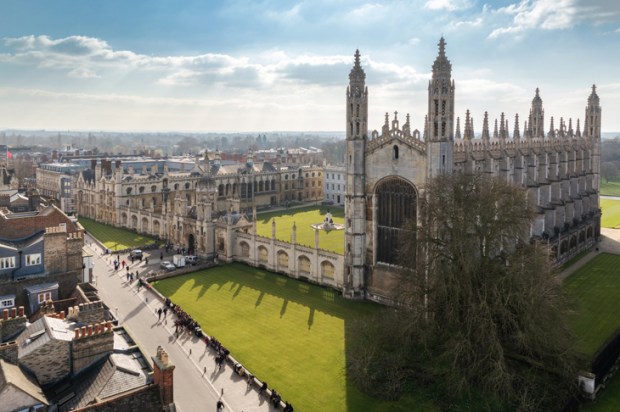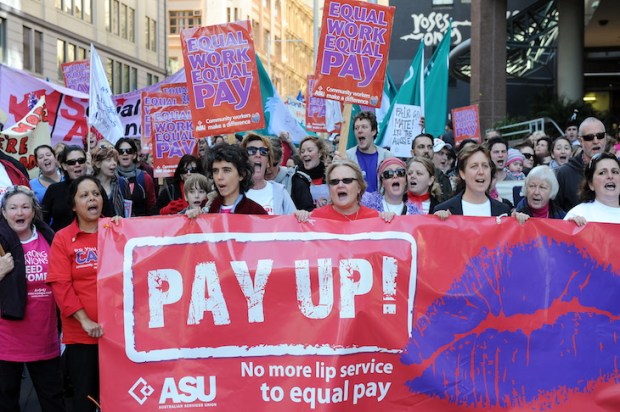In 1961, shortly after getting a job as a lecturer at Cambridge, my father had an idea. The faculty buildings, he discovered, were largely unused for six months of the year. The colleges, too, were empty. Why not create two Cambridges, one for term time and one for the holidays? Unlike the Cambridge of dreaming spires and glittering prizes, the second would be for ordinary people who’d missed out on the chance of a university education — labourers, tradesmen, clerks, housewives. It wouldn’t be a place of privilege and over-indulgence, but of hard-working people eager to soak up knowledge. And instead of propping up the English class system, it would turn it on its head.
When he presented this proposal to the university authorities he was met with near universal derision. One don drew attention to his use of the word ‘campus’ to describe the university’s footprint — a ghastly Americanism that no self-respecting Cambridge man would ever use. It was as if some crazy, socialist idealist had suggested to the owners of a stately home that they let their servants sleep in their beds when they weren’t there.
But my father was a tenacious man. He quickly established that the redbrick universities were also empty for half the year and tried the idea out on them. He was expecting a warmer reception — after all, they knew what it was to be looked down on by the elite. But they turned out to be equally dismissive. Having acquired a soupçon of respectability, they weren’t about to jeopardise it by admitting any Tom, Dick or Harry. He reluctantly concluded that the only way to get his new venture off the ground was if it didn’t have a ‘campus’. Lectures would be broadcast on television and academics and students would communicate via mail. In 1963 he wrote an article in a magazine called Where? setting out his vision for a college based on these principles. He called it the ‘Open University’.
I tell this story because of the parallels between the response to my father’s idea and the tsunami of opposition from the university establishment to the government’s Higher Education and Research Bill. On Monday, a wrecking amendment to the bill was passed in the House of Lords, but Jo Johnson, the universities minister, is unlikely to give up. If he manages to get it through Parliament, the bill will make it much easier for new providers to obtain university status. That will make it harder for second- and third-rate institutions to charge the maximum tuition fees and, by increasing choice, transfer power from university authorities to students.
Some of the opposition to the bill is just straightforwardly political, with left-wing critics objecting to the fact that some new providers will be profit-making. Marxist academics complain about the ‘marketisation’ of higher education and dismiss their potential competitors as ‘free–market’ universities. Bizarrely, even some conservatives have taken this line — or should that read former conservatives? Chris Patten, the chancellor of Oxford University, has mocked the idea that the bill would provide ‘a shot of entrepreneurial vim’ to the sector and compared the values underpinning it to those of Philip Green.
Others oppose it because it will create a new regulator called the Office for Students that will not only have the power to grant new providers the right to award degrees, but also to revoke that right. This has led to a chorus of harrumphing among the professoriate, who’ve suggested — absurdly — that the OfS might remove the ability of Oxford and Cambridge to hand out degrees. The new bill, they insist, is an attempt by the government to assume control of the UK’s university sector.
I find it hard to take these high-minded objections seriously. Monopolists typically dress up their hostility to any competition as a matter of principle. I experienced many of the same arguments, including the ‘marketisation’ charge, when I helped set up one of England’s first free schools. Johnson claims the new regulatory architecture will guarantee universities’ autonomy, not undermine it. In any event, it’s preferable to the current set-up in which new entrants into the sector have to be ‘validated’ by their rivals. That’s a bit like asking universities to allow their empty buildings to be occupied by mature students during the holidays.
The Open University is now the largest academic institution in the UK, with more than 250,000 students on its roll. With a fair wind, these new reforms will prove similarly revolutionary.
Got something to add? Join the discussion and comment below.
Get 10 issues for just $10
Subscribe to The Spectator Australia today for the next 10 magazine issues, plus full online access, for just $10.















Comments
Don't miss out
Join the conversation with other Spectator Australia readers. Subscribe to leave a comment.
SUBSCRIBEAlready a subscriber? Log in